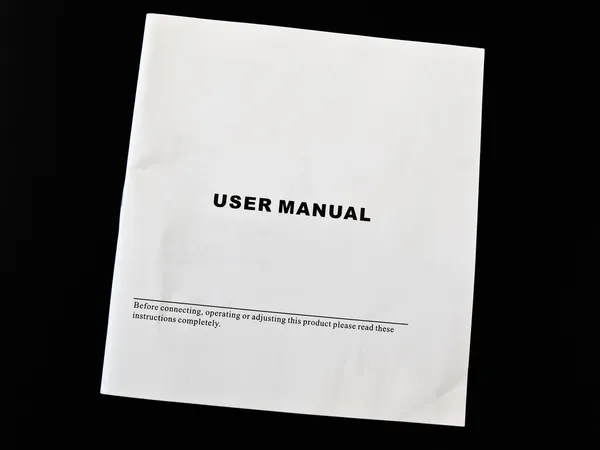Dyson Omni-glide™User manual
Top view of the Dyson Omni-glide™ machine, showing the cleaner head, wand, bin, and main body.
In the box
Main body showing the handle and bin attached
Vacuum cleaner
The Dyson omnidirectional Fluffy™ cleaner head with two brush bars and the connector end pointing upwards.
Dyson omnidirectional Fluffy™ cleaner headEngineered for hard floors. Glides in all directions – forwards, backward, even sideways.The narrow connector end at the top connects to the bin and the wider end at the bottom connects to the cleaner head or tool.
 Wand
Wand
A charger is a one-piece unit with the plug, connector end, and cable.
 ChargerCharges your vacuum with or without a dock.Some tools may not be included.You can buy additional tools at www.dyson.com.
ChargerCharges your vacuum with or without a dock.Some tools may not be included.You can buy additional tools at www.dyson.com.
 Combination toolTwo tools in one – wide nozzle and brush, for quick switching between cleaning and dusting tasks around your home or car.This tool has a combination of the brush head and crevice tool together in one unit. The brush head slides down the crevice tool when needed.
Combination toolTwo tools in one – wide nozzle and brush, for quick switching between cleaning and dusting tasks around your home or car.This tool has a combination of the brush head and crevice tool together in one unit. The brush head slides down the crevice tool when needed.

Mini motorized toolMotorized brush bar, concentrated in a smaller head to remove stubborn dirt from mattresses, upholstery, and stairs.A small cleaner head with a body housing the motor and an electrical connector to attach to the wand or directly to the machine.

Worktop toolEngineered for cleaning kitchen worktops, tables, and hard surfaces.This tool is angled and has a nozzle end. Light pipe crevice toolCrevice tool with LED lights lets you reach into dark, narrow spaces and see where you’re cleaning.A long tool with an angled end.
Light pipe crevice toolCrevice tool with LED lights lets you reach into dark, narrow spaces and see where you’re cleaning.A long tool with an angled end.
Getting started

Charging your machine
For the best experience, we recommend fully charging your machine, and any additional batteries, as soon as you open the box and after every clean.The LED light on the end of the handle will flash when the power is running low and you need to put your battery on to charge.Connect the charger directly to the charging point on the base of the handle of your machine. You can also connect to your dock as shown in the installation instructions supplied with your dock.
 The LED light on the end of the handle will pulse with a blue LED light when charging, and the light will go out when fully charged.It can take up to four hours to fully charge your battery. Your battery has been designed to be left on charge.Your machine won’t operate or charge if the ambient temperature is below 5°C (41°F). This is designed to protect both the motor and battery.You can help prolong the battery life by leaving your machine to cool down before recharging.
The LED light on the end of the handle will pulse with a blue LED light when charging, and the light will go out when fully charged.It can take up to four hours to fully charge your battery. Your battery has been designed to be left on charge.Your machine won’t operate or charge if the ambient temperature is below 5°C (41°F). This is designed to protect both the motor and battery.You can help prolong the battery life by leaving your machine to cool down before recharging.
Changing your click-in battery
If you have additional click-in batteries, we recommend that you alternate the batteries to maintain even performance.Removing your batteryPush the battery release button on the handle and slide the battery off your machine.Charge the battery.The button on the end of the handle is pushed upwards to release the battery in the handle.

Refitting your batteryAlign your battery with the handle and slide it in.Push firmly until it clicks into place.

Emptying your bin
The MAX mark on the bin of the machine, showing that the dirt should not be filled over the Max mark when the machine is at the angle of normal use.
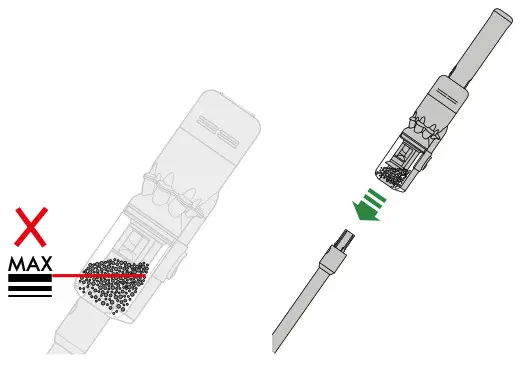 Empty your bin as soon as the dirt reaches the MAX mark.You may need to clean the filter more often if you use your machine with a full bin.Remove your wandPress the red wand release button, on the top of the wand, and pull the wand away from the bin.
Empty your bin as soon as the dirt reaches the MAX mark.You may need to clean the filter more often if you use your machine with a full bin.Remove your wandPress the red wand release button, on the top of the wand, and pull the wand away from the bin.
Release the dirtHold your vacuum over a bin.Push the red bin release button, taking care not to press the power button.The bottom of the bin will open and the shroud will slide down inside the bin, wiping away any dirt.If the bin doesn’t open, check the bin release button is pushed down fully.Illustration of the bin being emptied into a bag with images demonstrating to take care not to press the trigger when emptying the bin.
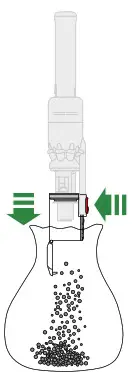 To remove the bin for emptying:If the bin doesn’t empty fully, remove the bin and empty the dirt.Press the red button located on the bin runner to release the bin and slide your bin off the runner.Minimize dust contactCover your bin tightly in a dust-proof bag while you empty. Remove the bin carefully, seal the bag tightly and dispose of.Two images of the bin with arrows showing the bin lid closing and a clicked symbol and the bin being pushed upwards with another click symbol.
To remove the bin for emptying:If the bin doesn’t empty fully, remove the bin and empty the dirt.Press the red button located on the bin runner to release the bin and slide your bin off the runner.Minimize dust contactCover your bin tightly in a dust-proof bag while you empty. Remove the bin carefully, seal the bag tightly and dispose of.Two images of the bin with arrows showing the bin lid closing and a clicked symbol and the bin being pushed upwards with another click symbol.  Reassemble your machineIf you have removed your bin, slide it back onto the runner. Make sure that the bin and lid are both securely in position.Push the bin base upwards until the bin and lid both click into place.Reconnect the wand.
Reassemble your machineIf you have removed your bin, slide it back onto the runner. Make sure that the bin and lid are both securely in position.Push the bin base upwards until the bin and lid both click into place.Reconnect the wand.
Cleaning your bin
The bin being removed and the location of the bin release lever on the underside of the bin runner.
 Don’t put any part of your machine in a dishwasher or use detergents, polishes or air fresheners.Clean your binIf it is necessary to clean your bin, empty it as shown in the ‘Emptying your bin’ section.Press the red button located on the bin runner to release the bin and slide your bin off the runner.Only clean your bin with a damp cloth.Make sure that the bin and seals are completely dry before replacing.
Don’t put any part of your machine in a dishwasher or use detergents, polishes or air fresheners.Clean your binIf it is necessary to clean your bin, empty it as shown in the ‘Emptying your bin’ section.Press the red button located on the bin runner to release the bin and slide your bin off the runner.Only clean your bin with a damp cloth.Make sure that the bin and seals are completely dry before replacing.
 Replace your binInsert the spine on to the bin runner.Close your bin by pushing the bin base upwards until the bin and bin base click into place.
Replace your binInsert the spine on to the bin runner.Close your bin by pushing the bin base upwards until the bin and bin base click into place.
Washing your filter
Wash your filter at least once a month to maintain the best performance.Make sure the filter is completely dry before refitting.Twist off your filterDon’t put any part of your machine in a dishwasher or use detergents, polishes or air fresheners.Turn your filter anti-clockwise and pull it away from your machine.Before washing your filter, tap it gently over a bin to remove any loose dust and debris. Filter held in an upright position, with the wider end in the palm of a hand. Water running from a tap into the narrower end.
Filter held in an upright position, with the wider end in the palm of a hand. Water running from a tap into the narrower end.
Wash your filterWash the outside of the filter, rubbing with your fingers to remove the dirt.Carefully rinse the inside filter, without allowing water to fill the filter.Repeat these steps until the water runs clear.

Filter with hand over the open end with arrows showing a shaking motion. Shake and dryEmpty the filter and shake firmly to remove excess water.Keep shaking until there’s no water coming from the filter.Place your filter end up, as shown.Leave your filter to dry for at least 24 hours in a well-ventilated, warm place.Don’t dry your filter in a tumble dryer, microwave or near a naked flame.Important: your filter must be completely dry before you put it back into the major machine could be damaged if used with a damp filter.
Shake and dryEmpty the filter and shake firmly to remove excess water.Keep shaking until there’s no water coming from the filter.Place your filter end up, as shown.Leave your filter to dry for at least 24 hours in a well-ventilated, warm place.Don’t dry your filter in a tumble dryer, microwave or near a naked flame.Important: your filter must be completely dry before you put it back into the major machine could be damaged if used with a damp filter.
 The filter is left to dry with the pleated filter end facing upwards.
The filter is left to dry with the pleated filter end facing upwards.
Refit your filterTo refit your filter, slide it onto the handle and turn it clockwise until it clicks into place.Your filter may need more frequent washing if you vacuum fine dust, use Max mode frequently or use with the bin full.

Washing your brush bars
To maintain optimum performance, check and wash the brush bars regularly.The brush bar release button is located on the top of the cleaner head and the brush bars slide out of the same end.Remove brush barsDon’t put any part of your machine in a dishwasher or use detergents, polishes, or air fresheners.Press the cleaner head release button to remove it from the wand.Pull the brush bars off the end cap and put the end cap to one side, don’t wash it.
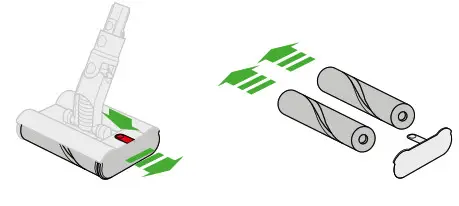
Wash and dry brush barsHold your brush bars under cold tap water and gently rub to remove any lint or dirt. Keep washing until the water runs clear.Stand the brush bars upright and leave for at least 24 hours to dry.
 Replace your brush barsMake sure your brush bars are completely dry before refitting.Each brush bar is engineered to correspond to a specific position on the end cap. It is important that both brush bars are fitted in the correct position.Slide the assembled brush bars back into the cleaner head.Push the end cap until it clips securely back into the closed position.The cleaner head housing is not washable and should only be wiped over with a damp lint-free cloth.
Replace your brush barsMake sure your brush bars are completely dry before refitting.Each brush bar is engineered to correspond to a specific position on the end cap. It is important that both brush bars are fitted in the correct position.Slide the assembled brush bars back into the cleaner head.Push the end cap until it clips securely back into the closed position.The cleaner head housing is not washable and should only be wiped over with a damp lint-free cloth.

The fittings on the end cap are on either side of a central point that locks into the cleaner head. One fitting is larger than the other and the ends of the brush bars will only fit on the corresponding fitting.
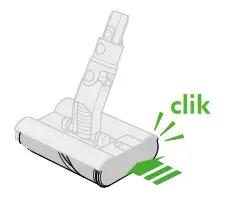
Cleaning your tools
Don’t put any part of your machine in a dishwasher or use detergents, polishes or air fresheners.Wipe with a damp, lint-free cloth, without touching the connector end.Make sure your tools are completely dry before using.

Clearing blockages
If your machine detects a blockage, the motor will pulse six times. You won’tbe able to use your machine until the blockage has been cleared.If you try to use your machine when the motor is pulsing, it will automatically cut out.Leave your machine to cool down before looking for blockages and, for your safety, take care not to touch the power button.
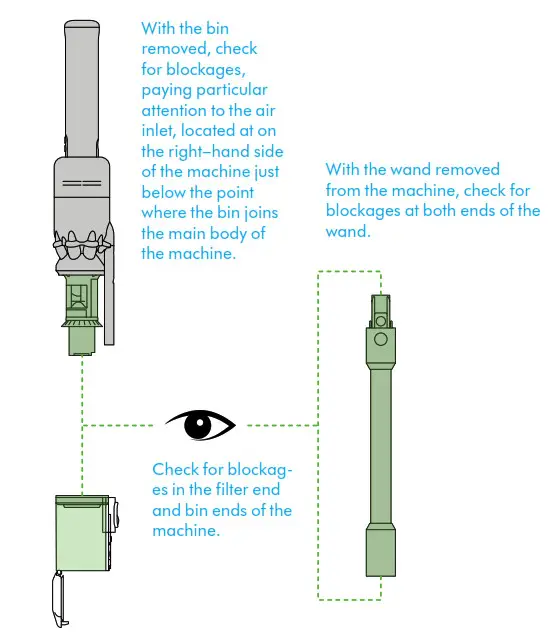
Disconnect your machine from the charger before looking for blockages.Be careful not to touch the power button and be aware of sharp objects.Leave your machine to cool down before looking for blockages.Don’t use your machine when looking for blockages as this could cause injury.

Looking after your machine
To always get the best performance from your machine, it’s important to clean it regularly and check for blockages.Look after your machineIf your machine is dusty, wipe with a damp lint-free cloth.Check for blockages in the cleaner head, tools, and main body of your machine.Wash your filter regularly and leave to dry completely.Don’t use detergents or polishes to clean your machine.Look after your batteryTo get the best performance and life from your battery, use Eco or Med mode.Your machine won’t operate or charge if the ambient temperature is below 5°C(41°F).This is designed to protect both the motor and battery.Your serial numbersYou can register your machine using the serial number found on the bottom of your machine.You can find your serial numbers on your machine, battery and charger.Use your serial number to register.
References
[xyz-ips snippet=”download-snippet”]

